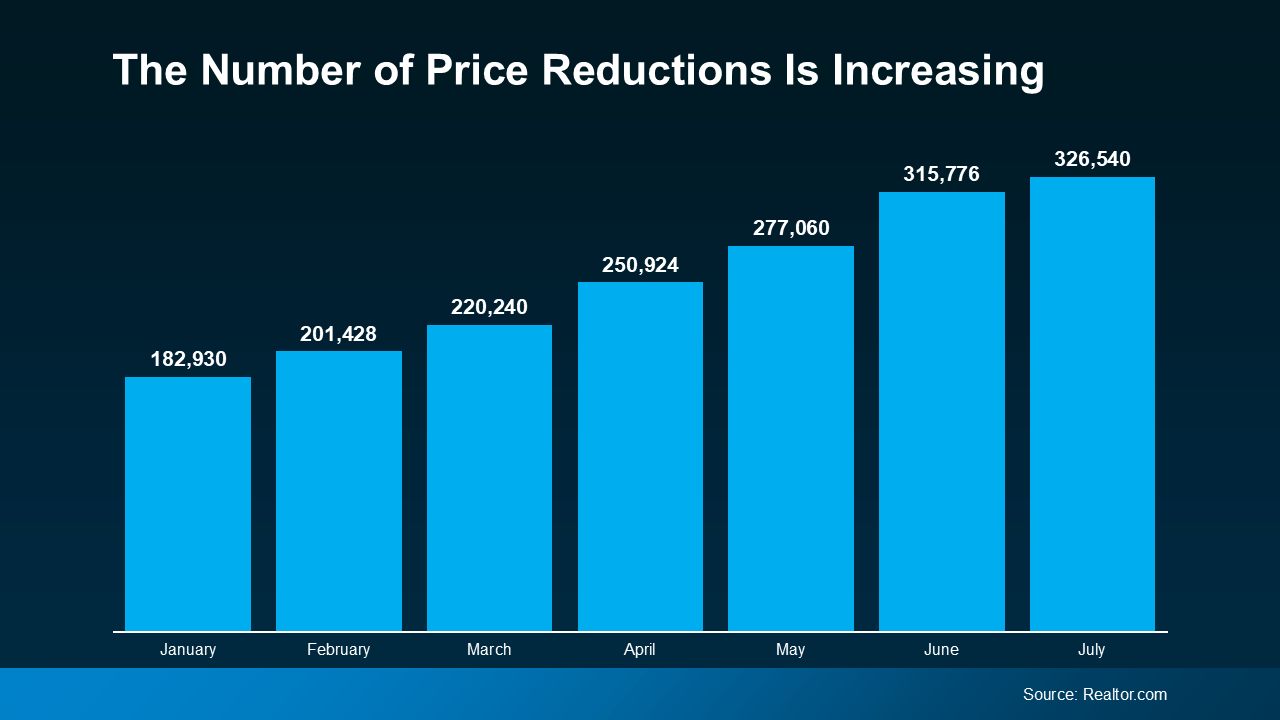
The Number One Mistake Sellers Are Making: Overpricing Their House
In today’s housing market, many sellers are making a critical mistake: overpricing their houses. This common error can lead to a home sitting on the market for a long time without any offers. And when that happens, the homeowner may have to drop their asking price to try to re-ignite buyer interest.
Data from Realtor.com shows the number of homeowners realizing this mistake and doing a price reduction is climbing (see graph below):
 If you’re thinking about making a move yourself, here’s what you need to know. The best way to avoid making a costly mistake is to work with a trusted real estate agent to find the right price. Here’s a look at what’s at stake if you don’t.
If you’re thinking about making a move yourself, here’s what you need to know. The best way to avoid making a costly mistake is to work with a trusted real estate agent to find the right price. Here’s a look at what’s at stake if you don’t.
Not Paying Attention To Current Market Conditions
Understanding current market conditions is key to accurate pricing. You don’t want to set your asking price based on what happened during the pandemic. The market has moderated a lot since then, so it’s far better to align your price with today’s reality.
Real estate agents stay updated on market trends and how they impact the pricing strategy for your house.
Pricing It Based on What You Want To Make (Not What It’s Worth)
Another misstep is pricing it based on what you want to make on the sale, and not necessarily current market value. You may see other homes in your neighborhood selling for top dollar and assume yours can do the same. But you may not be considering differences in size, condition, and features. For example, maybe that other house is waterfront or has a finished basement. To sum it up, Bankrate explains:
“How do you find that sweet spot of pricing for profit but not overpricing? The expertise of your agent can be truly valuable here. A knowledgeable agent will understand fair market value in your area, how much your house is worth and how much you might reasonably expect to get for it in the current market.”
An agent will do a comparative market analysis (CMA) to make sure your house is compared with truly similar properties to get an accurate look at how it should be priced.
Pricing High to Leave Room for Negotiation
Another common, yet misguided strategy is to price your house high on purpose, so you have more room to negotiate down during the sale. But this can backfire. A price that seems too high often deters potential buyers from even considering the home. So rather than leaving room for negotiation, what you’ll actually be doing is turning buyers away. U.S. News Real Estate explains:
“You want to sell your house for top dollar, but be realistic about the value of the property and how buyers will see it. If you’ve overpriced your home, chances are you’ll eventually need to lower the number, but the peak period of activity that a new listing experiences is already gone.”
An agent can help you set a fair price that attracts buyers and encourages more competitive offers.
Overpricing your home can have serious consequences. A knowledgeable real estate agent brings an objective perspective, in-depth market knowledge, and a strategic approach to pricing.
Let’s connect so you can avoid making a pricing mistake that’ll cost you.
The Number One Mistake Sellers Are Making: Overpricing Their House
Overpricing is the most common mistake sellers make when putting their house on the market. It’s a fatal flaw that can significantly delay the sale of your property, or even worse, lead to a sale at a lower price than you initially hoped for.
Why is overpricing such a problem?
When a house is overpriced, it simply doesn’t attract buyers. Potential buyers do their research. They compare your property to others on the market and quickly realize that your asking price is out of line. This can discourage them from even considering your home, let alone making an offer.
So, how can you avoid overpricing your house?
The key is to set a fair price that attracts buyers. This requires a deep understanding of today’s housing market and the value of your property.
A knowledgeable agent is invaluable in this process. They have the expertise to assess your home’s condition, location, and features, and compare it to similar properties that have recently sold. This information allows them to provide you with an accurate pricing estimate.
The expertise of your agent is crucial. They understand the local market dynamics and can help you set a price that is both competitive and attractive to buyers. Remember, a slightly lower asking price can often lead to a quicker sale and a higher overall return.
You want to sell your house for top dollar, but overpricing can actually hinder your chances of achieving that goal. By working with a trusted real estate agent and setting a fair price, you can increase your chances of a successful sale.
Here are some additional tips for pricing your home:
- Don’t rely solely on online valuations. While online tools can provide a general estimate, they often lack the nuance and detail that a professional agent can offer.
- Consider the local market conditions. Is the market hot or cold? Are interest rates rising or falling? These factors can significantly impact the demand for your property.
- Be realistic about your home’s condition. If your home needs repairs or updates, factor that into your pricing.
- Listen to your agent’s advice. They have the experience and knowledge to guide you through the pricing process.
By following these tips and working with a knowledgeable real estate agent, you can avoid the pitfalls of overpricing and increase your chances of selling your house quickly and for a fair price.
Additional Resources
- West Palm Beach mortgage broker: https://americasmortgagesolutions.com/contact-americas-mortgage-solutions/
- Affordable West Palm Beach home loans: https://americasmortgagesolutions.com/purchase
- Best mortgage rates in West Palm Beach: https://christianpenner.lendtelligent.com/mortgagepayment.aspx
- First time home buyer loans in West Palm Beach: https://americasmortgagesolutions.com/learn/loan-options/first-time-home-buyers/
- West Palm Beach refinancing options: https://americasmortgagesolutions.com/learn/mortgage-refinance/
- Local mortgage lenders in West Palm Beach: https://www.savvycard.com/christianpenner/mortgage/627d1_scid
- West Palm Beach mortgage calculators: https://americasmortgagesolutions.com/resources/calculator/
- Property loan advice in West Palm Beach: https://americasmortgagesolutions.com/west-palm-beach/
- Commercial mortgage broker in West Palm Beach: https://www.savvycard.com/christianpenner/mortgage/627d1_scid
- Mortgage preapproval in West Palm Beach: https://bc1f64af4d804420ac5365aedfe6c878.preapprovemeapp.com/Portal/1480/53703/Landing
The Price of Overpricing: The Hidden Costs
While the immediate consequences of overpricing a house are often clear—a lack of interest from buyers and potential delays in the sale—there are also hidden costs that sellers may not fully consider.
Increased Holding Costs
The longer a house remains on the market, the higher the holding costs become. These costs can include:
- Mortgage payments: Continuing to pay your mortgage while your house is unsold.
- Property taxes: These taxes are assessed based on the property’s assessed value, regardless of whether it’s on the market.
- Homeowners insurance: This coverage is typically required by lenders and can be expensive, especially for high-value properties.
- Utilities: Even if you’re not living in your home, you’ll still need to pay for utilities such as electricity, water, and gas.
- Maintenance costs: Maintaining a vacant property can be costly. You may need to hire someone to mow the lawn, clean the gutters, or address any maintenance issues that arise.
Reduced Negotiating Power
Overpricing a house can significantly reduce your negotiating power. If your asking price is significantly higher than the market value, buyers may be less willing to negotiate on the price. They may feel that they’re already getting a good deal at your asking price.
Negative Market Perception
A house that has been on the market for a long time can create a negative market perception. Potential buyers may wonder why the house hasn’t sold and may become suspicious of any underlying issues.
Emotional Toll
The process of selling a house can be emotionally draining. Overpricing can prolong this process and increase the emotional toll on sellers. This can lead to stress, frustration, and even financial hardship.
The Importance of Pricing Right from the Start
To avoid these hidden costs and maximize your chances of a successful sale, it’s essential to price your house right from the start. By working with a knowledgeable real estate agent and setting a fair price, you can avoid the pitfalls of overpricing and ensure a smooth and stress-free selling process.
Remember, a slightly lower asking price can often lead to a quicker sale and a higher overall return. By pricing your house competitively, you can attract more buyers and increase your chances of negotiating a favorable deal.
The Role of a Knowledgeable Real Estate Agent in Pricing Your Home
A knowledgeable real estate agent is essential in pricing your home correctly. They have the expertise to assess your home’s condition, location, and features, and compare it to similar properties that have recently sold. This information allows them to provide you with an accurate pricing estimate.
Here’s how a knowledgeable agent can help:
- Market analysis: They can analyze recent sales data to determine the current market value of similar properties in your area.
- Competitive pricing: They can help you set a price that is competitive with other homes on the market.
- Negotiation skills: They can negotiate effectively with buyers to help you get the best possible price for your home.
- Staging advice: They can provide advice on staging your home to make it more appealing to buyers.
- Marketing expertise: They can help you market your home effectively, including online listings, open houses, and targeted advertising.
By working with a knowledgeable real estate agent, you can increase your chances of selling your house quickly and for a fair price.
Additional Tips for Pricing Your Home
- Consider the time of year. Certain times of year, such as the spring and summer, may be more favorable for selling your home.
- Be flexible with your pricing. If your home has been on the market for a while, you may need to be willing to adjust your asking price.
- Don’t be afraid to negotiate. Negotiating with buyers can help you get a better price for your home.
By following these tips and working with a knowledgeable real estate agent, you can avoid the pitfalls of overpricing and increase your chances of a successful sale.
Conclusion
Overpricing your house is one of the most common mistakes sellers make. It can significantly delay the sale of your property, reduce your negotiating power, and increase the emotional toll on you.
To avoid the pitfalls of overpricing, it’s essential to set a fair price that attracts buyers. This requires a deep understanding of today’s housing market and the value of your property.
A knowledgeable real estate agent can be invaluable in this process. They have the expertise to assess your home’s condition, location, and features, and compare it to similar properties that have recently sold. This information allows them to provide you with an accurate pricing estimate.
By working with a trusted real estate agent and setting a fair price, you can increase your chances of a successful sale and achieve your goals as a seller.
Remember, a slightly lower asking price can often lead to a quicker sale and a higher overall return. By pricing your house competitively, you can attract more buyers and increase your chances of negotiating a favorable deal.
Home Staging: Making Your House More Appealing to Buyers
Home staging is the process of preparing a property for sale by presenting it in its best possible light. It involves arranging furniture, decor, and accessories to create a welcoming and inviting atmosphere.
Here are some key elements of home staging:
- Decluttering: Remove unnecessary items to create a sense of spaciousness.
- Depersonalization: Remove personal items that may distract potential buyers.
- Neutral colors: Paint the walls in neutral colors to appeal to a wider range of buyers.
- Lighting: Ensure that the home is well-lit, both naturally and artificially.
- Curb appeal: Make a good first impression by maintaining the exterior of your home.
Here are some additional tips for home staging:
- Create focal points: Highlight the best features of your home by creating focal points.
- Use fresh flowers: Fresh flowers can add a touch of color and freshness.
- Stage each room appropriately: Consider the function of each room when staging.
- Hire a professional stager: If you’re unsure about how to stage your home, consider hiring a professional.
By following these tips, you can make your home more appealing to buyers and increase your chances of a successful sale.
Negotiating with Buyers: Tips for Getting the Best Deal
Negotiating with buyers can be a challenging process, but with the right approach, you can achieve your goals and get the best possible price for your home.
Here are some tips for negotiating with buyers:
- Be prepared: Research the market and know the value of your home.
- Set a bottom line: Determine the minimum price you’re willing to accept.
- Be flexible: Be open to compromise, but don’t give away too much.
- Listen carefully: Pay attention to the buyer’s concerns and try to address them.
- Be confident: Project confidence and believe in the value of your home.
- Don’t be afraid to walk away: If the deal isn’t right, you can always walk away and find another buyer.
Here are some common negotiation tactics that buyers may use:
- Lowball offers: Buyers may offer a price significantly lower than your asking price.
- Conditional offers: Buyers may make their offer contingent on certain conditions, such as financing or inspections.
- Time pressure: Buyers may try to pressure you into accepting a lower price by suggesting a deadline.
By understanding these tactics and being prepared to negotiate, you can increase your chances of getting the best possible price for your home.
Overpricing Your House: A Costly Mistake
Overpricing remains one of the most common mistakes sellers make when putting their house on the market. It’s a fatal flaw that can significantly delay the sale of your property, or even worse, lead to a sale at a lower price than you initially hoped for.
Why is overpricing such a problem?
When a house is overpriced, it simply doesn’t attract buyers. Potential buyers do their research. They compare your property to others on the market and quickly realize that your asking price is out of line. This can discourage them from even considering your home, let alone making an offer.
So, how can you avoid overpricing your house?
The key is to set a fair price that attracts buyers. This requires a deep understanding of today’s housing market and the value of your property.
A knowledgeable agent is invaluable in this process. They have the expertise to assess your home’s condition, location, and features, and compare it to similar properties that have recently sold. This information allows them to provide you with an accurate pricing estimate.
The expertise of your agent is crucial. They understand the local market dynamics and can help you set a price that is both competitive and attractive to buyers. Remember, a slightly lower asking price can often lead to a quicker sale and a higher overall return.
You want to sell your house for top dollar, but overpricing can actually hinder your chances of achieving that goal. By working with a trusted real estate agent and setting a fair price, you can increase your chances of a successful sale.
Additional Considerations for Overpricing
- Increased Holding Costs: The longer a house remains on the market, the higher the holding costs become, including mortgage payments, property taxes, homeowners insurance, utilities, and maintenance costs.
- Reduced Negotiating Power: Overpricing can significantly reduce your negotiating power, as buyers may be less willing to negotiate on the price.
- Negative Market Perception: A house that has been on the market for a long time can create a negative market perception, potentially deterring buyers.
- Emotional Toll: The process of selling a house can be emotionally draining. Overpricing can prolong this process and increase the emotional toll on sellers.
To avoid these pitfalls, it’s essential to:
- Work with a knowledgeable real estate agent.
- Conduct thorough market research.
- Set a realistic asking price.
- Be flexible and willing to negotiate.
By following these tips, you can increase your chances of selling your house quickly and for a fair price.
Read from source: “Click Me”
Questions, Comments or For more information you can call
Christian Penner Branch Manager at 561-316-6800 or email us at TheMortgageTeam@ChristianPenner.com
Approval Hotline: 561-316-6800
Helping You Achieve the American Dream of Home Ownership
Or You can click “Call Me” below to call Christian Penner directly using Google Voice
















